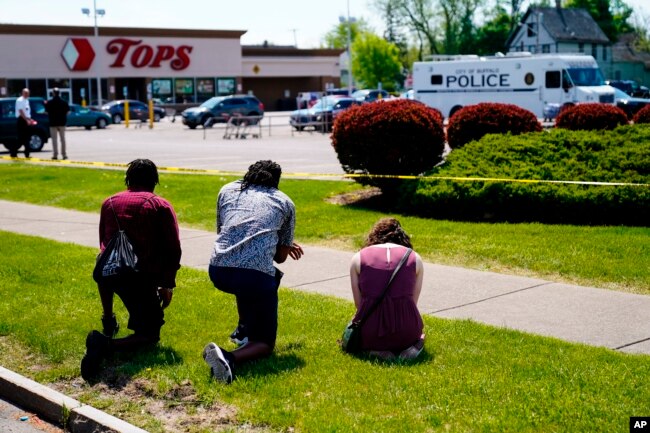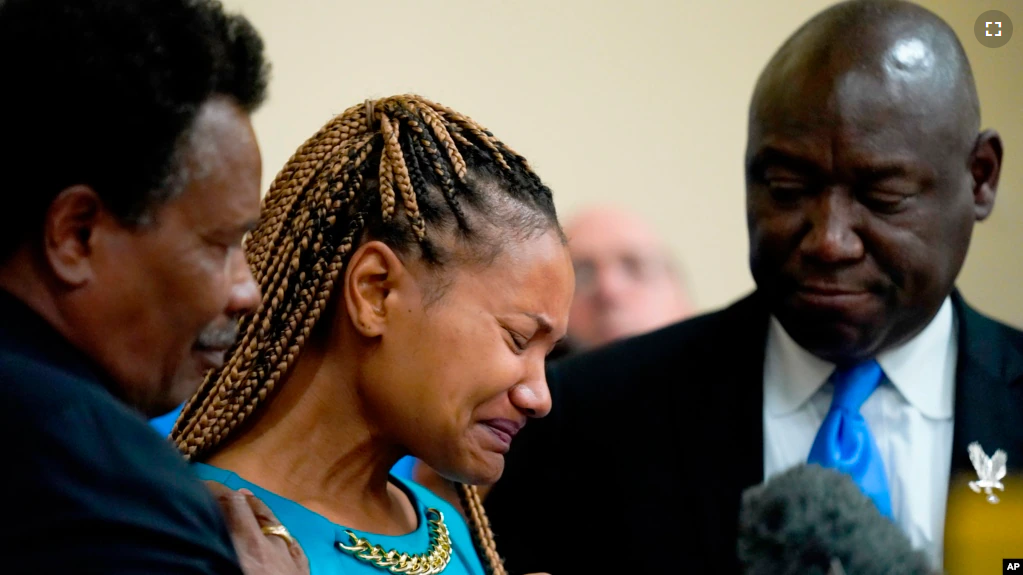A gunman killed 10 people at a food store in Buffalo, New York, over the weekend.
Law enforcement officials said the gunman, 18-year-old Payton Gendron, drove over 300 kilometers from his home to Tops Friendly Market. They said that Gendron, a white man, searched for and targeted the largely Black neighborhood.
Gendron shot 13 people. All but three of them died. Eleven of the shooting victims were Black and two were white.
Officials say they are studying a 180-page document published online believed to be written by Gendron. The document describes plans for the Saturday attack in Buffalo. It also makes note of other racist shootings, including the 2015 attack at a Black church in South Carolina and the killings at two Muslim religious centers in New Zealand in 2019.
The document describes a racist ideology that believes the United States belongs fully to white Christians. People of all other races and religions, the document says, are “replacers” who should be removed by force or terror.
The ideas come from what is known as “The Great Replacement Theory.”
What is ‘The Great Replacement Theory’?
People who follow the theory believe that there is a plot to reduce the influence of white people in the United States and other Western countries. Believers say the plan will be achieved through immigration of non-white people into the U.S. and the higher birthrate among minority groups.
Some followers believe Jewish people are behind the so-called replacement plot. When white supremacists marched in Charlottesville, Virginia, in 2017, they shouted “you will not replace us” and “Jews will not replace us.”

Who are the believers?
Mark Pitcavage is senior researcher at the Anti-Defamation League Center on Extremism. He said the more extreme believers look up to white supremacist mass killers like the shooters who carried the attacks in South Carolina and New Zealand. They believe small societal changes will not do much, so the only solution is tearing down society – in this case, killing.
The Buffalo shooter’s alleged writings and some of his methods appeared to follow the New Zealand shooter. Gendron livestreamed the attack, just like the shooter who attacked mosques in New Zealand. Gendron marked the number 14 on his gun. Pitcavage said 14 is shorthand for a 14-word white supremacist slogan.
The New Zealand shooter posted a widely read document online. If the 180-page document from the Buffalo shooter is real, it seems he wanted to spread his beliefs and methods to a larger audience.
In a public opinion study released last week, The Associated Press and the NORC Center for Public Affairs Research found that about 1 in 3 Americans believes an effort is underway to replace U.S.-born Americans with immigrants for electoral gain.
The same number of people also express concern that an increase in immigration is leading to native-born Americans losing economic, political, and cultural influence. Both concerns are arguments behind the Great Replacement Theory.
‘It’s not right’
The idea that those killed at the Tops Friendly Market lost their lives because of the shooter’s racism is “sick,” said 29-year-old Steve Carlson. He is Black and grew up knowing one of the shooting victims.
“It’s not right. You don’t pick what ethnicity you’re born into,” Carlson said. “These people were just shopping, they went to go get food for their families.”
At Buffalo’s State Tabernacle Church of God in Christ, Pastor Russell Bell said he could not believe what had happened over the weekend.
“I don’t understand what that is, to hate people just because of their color, to hate people because we’re different. God made us all different. That’s what makes the world go ’round,” he said.
I’m Ashley Thompson.
Hai Do adapted this story for Learning English based on reporting by the Associated Press.
___________________________________________________________________
Words in This Story
racist – n. person who believes that some races are better than others
ideology – n. a set of ideas and beliefs of a group
replacer – n. a person who is put in place of another
alleged – adj. said to have happened but not yet proven
slogan – n. a word or phrase that is used by a group to attract attention
